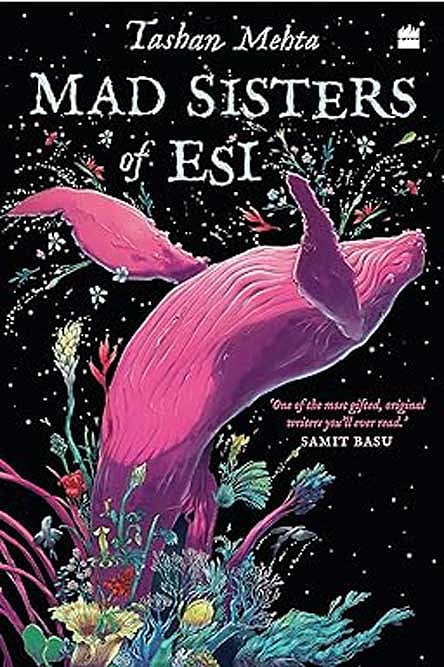Cosmic Chaos

Two sisters, Myung and Laleh, wake to life in an artificial whale, “a baby universe…with asteroids and dwarf planets stuck to its skin,” which is divided into thousands of different chambers. One sister is content and wants to stay, while the other, Myung is looking for a way out, to leave the whale, and explore the universe, or the “black sea”. Myung’s search leads her to another artificial creation, a shapeshifting island called Odja, with a painted sun.
This quest in turn unfolds into the origin story of these artificial worlds, which forms the spine of the narrative, and then onto the lives of the two creators, the titular mad sisters, Magali and Wisa. This Venn circled plot, with two artificially made habitats, one a sentient island, and another a sentient whale, where the boundaries between magic and technology flow sensuously and seamlessly leads to the island of Esi, the original home of the sisters.
Fantasy has been defined as a “stepped journey” with a quest, usually for a magical artefact at its heart. The landscape in such a quest, “functions as a character, … endowed with animate traits as the fantasy world itself seeks to heal the rift that threatens its destruction”.
The immense influence of JRR Tolkien’s Middle Earth means that the landscape of Northern European tradition and the narrative vocabulary of Norse high sagas has been baked into modern fantasy, with dragons, armoured knights and quasi-medieval kingdoms.
Mehta however opts for a unique approach to the underlying culture of her world. While characters climb mango trees, experience monsoons, eat at ‘sea dhabas’, and wear dhotis, it isn’t really the sub-continent, but is similar to how the Pacific Northwest informed Ursula LeGuin’s Earthsea. The universe here is recast as a sea, where planets are islands and cosmonauts are sailors. Keeping with this, Mehta reworks sub-genres such as the Robinsonade (after Robinson Crusoe), featuring a shipwrecked survivor on a hostile island, and also mixes teenage romance and endows a coming-of-age arc to a key character. Like all fantasy worlds, this one rests on the bones of an older world, of primeval magic, of a race of alchemists. Esi, an enchanted isle marked by causality violations, is vividly brought to life.
AIming High
20 Feb 2026 - Vol 04 | Issue 59
India joins the Artificial Intelligence revolution with gusto
Mehta also displays ambivalence to the scaffolding of fantasy; as Myung explains, “there are two types of quests—moving and waiting. The first kind of knight moves in search of what she wants. The second…she waits”.
There are invented research fields such as mirablia diachronism, an “academic discipline that studies how fairy tales change through time” to find the “bit of history that historians missed, the quiet pieces of time no one was looking at”. The fantasy is counterpointed by dry excerpts from academic journals and footnotes from tomes such as the “The Tola Dictionary of the Inexplicable” or “Hocus-Pocus: Summoning the Black Sea’s Forgotten Magic”.
Mehta doesn’t traffic in the usual tropes, for instance, there is no “dark lord” to oppose, or someone who needs saving. This however also means that there is no verve to the proceedings at times. This, in combination with Mehta’s hyper detailed descriptions, for instance, a character is described as “prickly but tender-hearted. She is a twisted amalgamation of rage, loneliness and an unsquashable desire to be loved, which she nonetheless tries very hard to squash,” means that at times it feels the characters have been lined up inertly in front of a painted backdrop.
The thread that runs throughout is that of memory-keeping, of bearing witness, a universe where Plato’s idea of anamnesis, where “every act of cognition is an act of the soul remembering having been part of the world of ideas, which is also the realm of truth” is made true.

